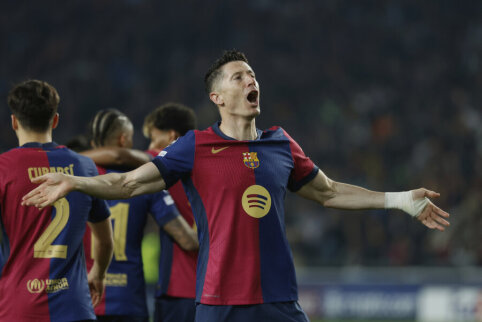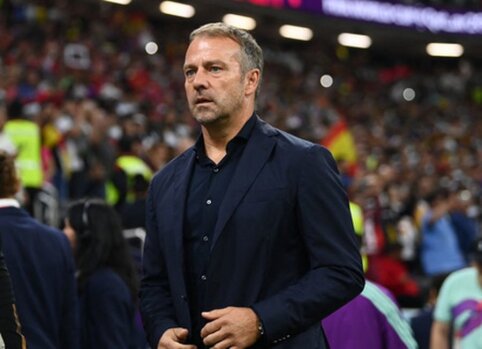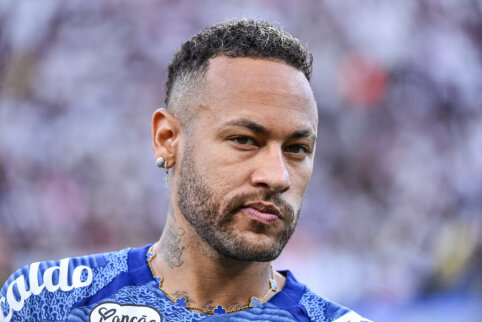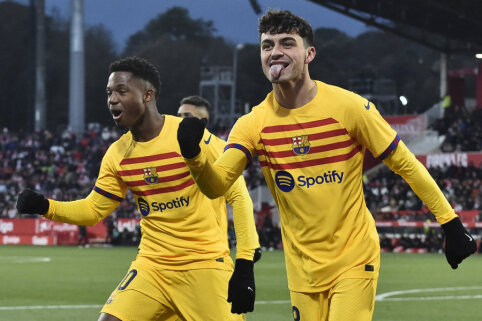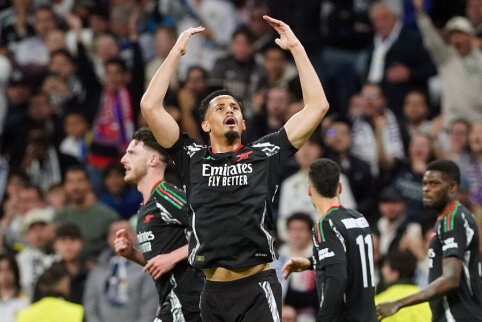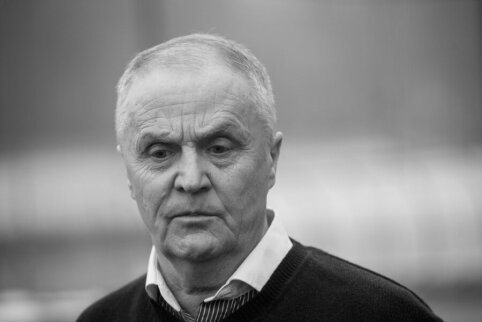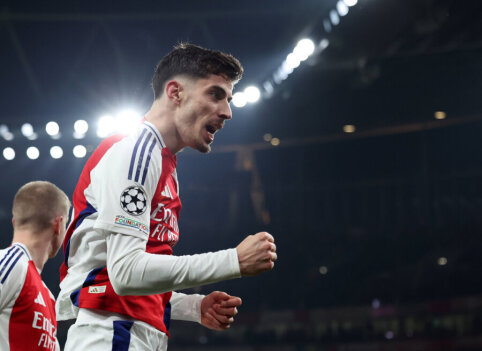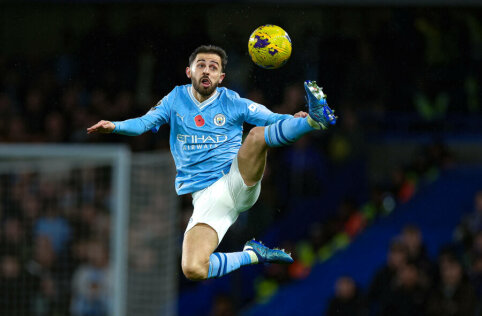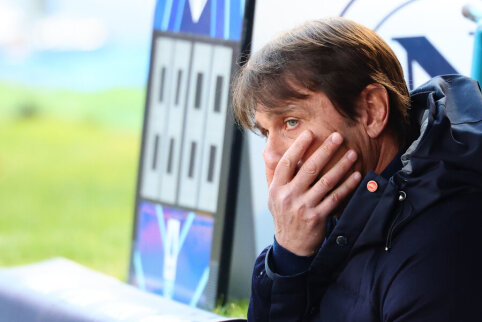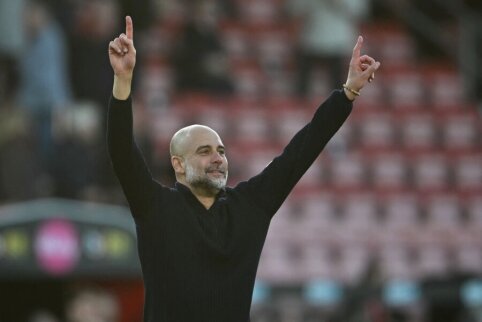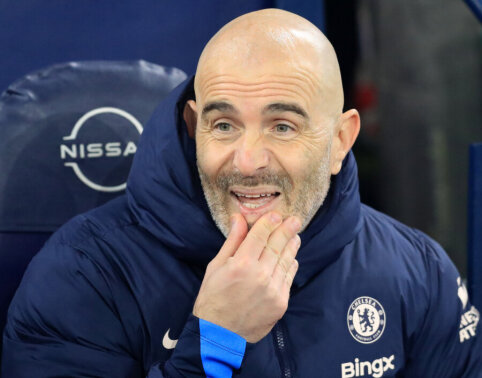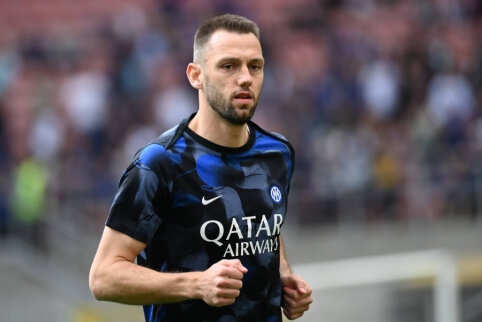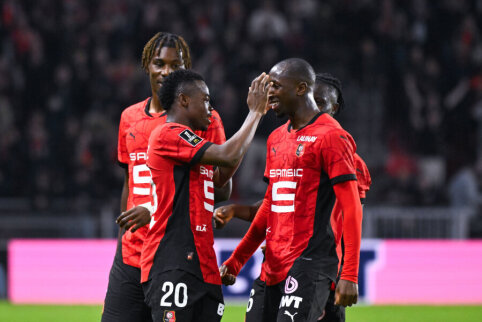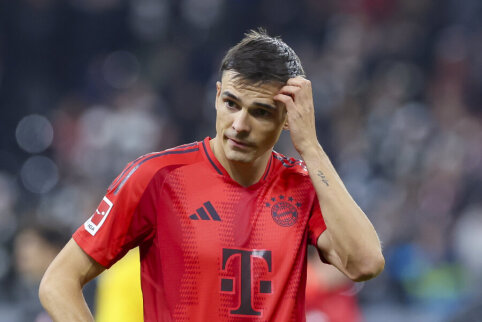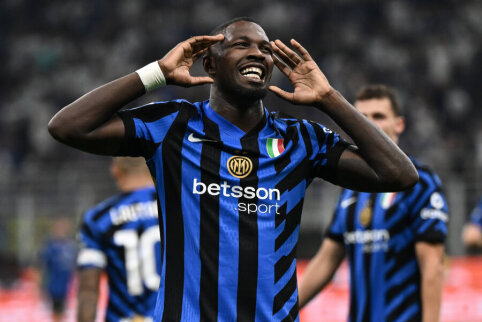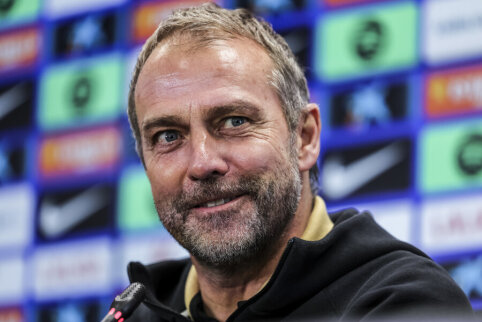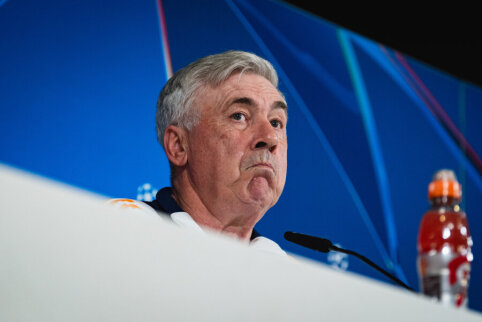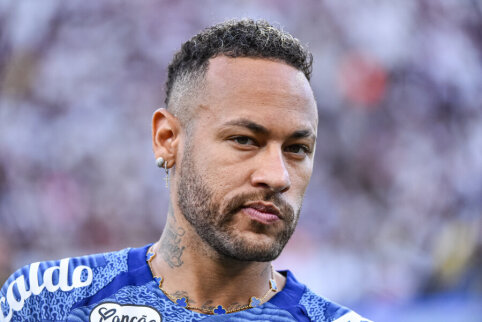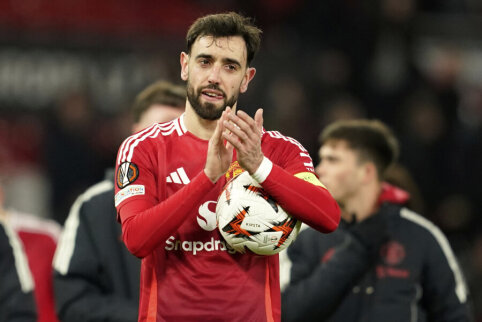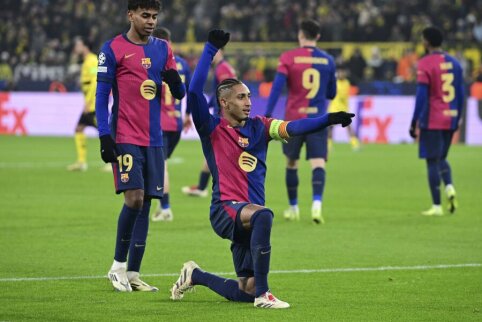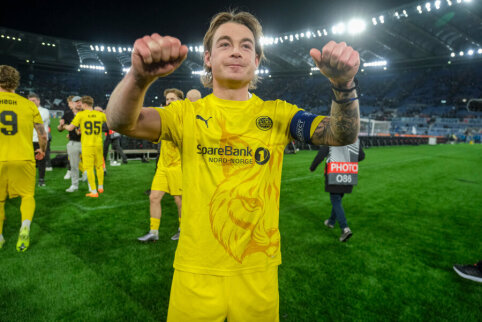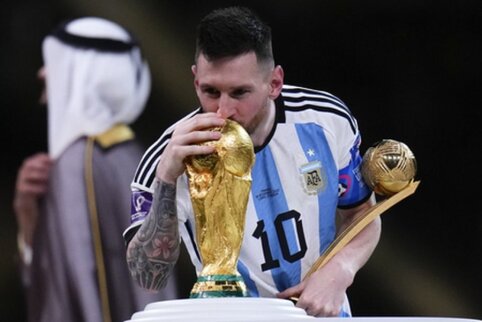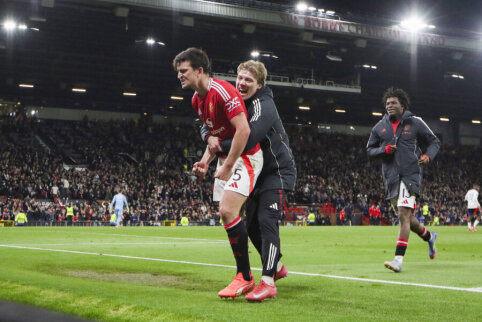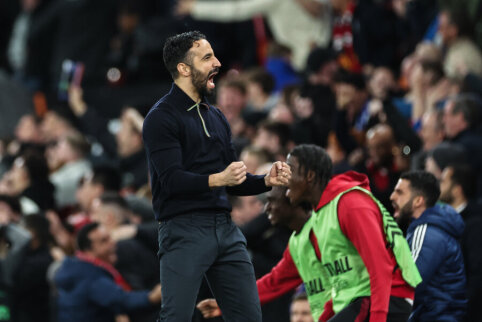 © EuroFootball.com
© EuroFootball.com
Recently, the attention of the English press has turned to the London "Arsenal" club and its long-time coach Arsene Wenger. This happened because the vice president of "Arsenal," David Dein, who had a friendly relationship with the coach for over ten years, left the club. Discussions about Wenger's future at the team have not stopped, so in the "Tribune" section, we publish an article by EuroFootball.com visitor and "Arsenal" fan Vytautas about the coach's decade at the London club.
Who is Arsene Wenger?
That was the question that arose to many journalists when "Arsenal" introduced a new coach in 1996. Now, to most football enthusiasts, that question would seem at least silly. Over the course of 10 years, he became the most successful coach in the club's history, known as an intelligent and charismatic personality. In his collection, there are 3 Premier League champion titles, 4 FA Cups. In two seasons, a double was won (Premier League champion title and FA Cup), in 2004, under Wenger's leadership, "Arsenal" managed to finish the Premiership season undefeated. Furthermore, "Arsenal" consistently played technical and visually attractive football that captivated both the club's fans and other football enthusiasts.
Biography
Beginning of Coach Career
The first professional club coached by Arsene Wenger was "Nancy." He spent three seasons at this club from 1984 to 1987, without any significant achievements. However, the Professor's (he received this nickname while working at "Arsenal") career took off in 1987 when he was called to the "Monaco" club. Wenger won the French league in 1988 and the cup in 1991, and acquired high-level players such as Glenn Hoddle, George Weah, and Jurgen Klinsmann. He remained loyal to the "Monaco" club, although clubs like Real Madrid and Bayern Munich were interested in him. Wenger was also offered to train the French national team. Unfortunately, in the 1994-95 season, "Monaco" started very poorly, and Wenger was dismissed.
Unexpectedly, this Frenchman continued his career in Japan at the Nagoya Grampus Eight club. Before Wenger's arrival, the club struggled at the bottom of the J-League standings. In 18 months, Wenger and this club won the Emperor's Cup and finished the season in second place in the league. However, the more important experience for Wenger, perhaps, was the one he gained in Japan. It was here that he became acquainted with the basics of healthy eating, which he later successfully applied to the "Arsenal" team. Wenger was also fascinated by the investments of Japanese clubs in football schools, where players were trained from childhood.
First Seasons with "Arsenal"
After George Graham was dismissed from the position of head coach of "Arsenal," the club management struggled to find a suitable replacement for him. Graham's assistant, Stewart Houston, was only a temporary solution to the problem, while Bruce Rioch left the team after a dispute with the management. Arsene Wenger had long been acquainted with "Arsenal" vice-president David Dein. In August 1996, after Bruce Rioch left the club, French Football Federation's technical director Gerard Houllier suggested to Dein to hire Arsene Wenger. "Arsenal" approved the new coach on September 28, and he started working on October 1. Wenger became the first "Arsenal" coach who did not come from Britain or Ireland.
The Frenchman immediately started working according to his methodology. Even before becoming a coach, he convinced the club to buy players from France Patrick Vieira and Remi Garde. In the first season with the new coach, "Arsenal" finished third but failed to qualify for the Champions League. However, success was not long in coming. In the 1997-98 season, the team led by Professor won the FA Cup and the Premier League. It was the second double in the club's history.
The legendary "Arsenal" defensive line played wonderfully: Tony Adams, Martin Keown, Lee Dixon, and Nigel Winterburn. The new signings looked excellent in the safety line. This included the then-young Patrick Vieira, Marc Overmars, and Emmanuel Petit, whom Wenger converted from a central defender to a defensive midfielder. In attack, "Arsenal" had the dazzling "Flying Dutchman" Dennis Bergkamp and the young Nicolas Anelka. The latter, who came from Paris St. Germain, was bought for £500,000, and after two years, Real Madrid poached this player from the "gunners" for £22.3 million.
In the following seasons, "Arsenal" could not beat the legendary Manchester United team led by Sir Alex Ferguson, which was led on the field by Ryan Giggs, Roy Keane, and other famous players.
Most Successful Seasons
However, Arsene Wenger did not give up. The money received for Nicolas Anelka was spent on players who would become undisputed leaders of the team in the future. This included Robert Pires, Sylvain Wiltord, and now the all-time top scorer Thierry Henry for "Arsenal." Their paths had crossed with Wenger's even in the Monaco team. However, at "Arsenal," this Frenchman came not just as a forward but as a fast full-back. Wenger decided to change his position, and now it can confidently be said that he did not make a mistake.
The new players needed time to adapt, but in 2002, "Arsenal" again became the strongest in England. Under Arsene Wenger's leadership, the players won a double for the second time. The pinnacle of the season was the match at Old Trafford against Manchester United. "Arsenal" only needed a draw to secure the championship title, but all the players were thinking only about victory. The match ended 0-1 in favor of "Arsenal." Sylvain Wiltord scored the decisive goal, allowing all fans to enjoy the title, which was won at one of the club's biggest rivals' temple. Four days before this victory, "Arsenal" beat "Chelsea" 2-0 at Cardiff's Millennium Stadium and won the FA Cup. "Arsenal" did not lose any of the Premier League away games, scoring at least one goal in all 38 matches. The last 13 games of the league ended in victories for "Arsenal."
Before the new season, the club said goodbye to the team legend and captain Tony Adams, and Patrick Vieira became the new captain. The Gunners started the 2002-03 season as successfully as they finished the previous one. It seemed that no one could stop them, and "Arsenal" would defend the highest English football division champions title for the first time in the club's history. Unfortunately, this dream of the fans was not destined to come true. "Arsenal" fell into a pit, played unstably. Manchester United became the champions, but "Arsenal" managed to win the FA Cup.
These were the last years when the Gunners were represented by the legendary goalkeeper David Seaman. The search for a new goalkeeper raised much discussion. Wenger decided to buy Borussia Dortmund goalkeeper Jens Lehmann, even though he was already a veteran. Once again, Wenger's intuition turned out to be excellent, as Lehmann impressively guarded the team's goal in the following seasons.
The 2003-04 season will forever enter not only Arsenal's history but also the entire history of English football. At the end of the 2001-02 season, Wenger was asked if the team could go through a season without losing any matches. The Frenchman replied that nothing is impossible, and a couple of years later, he proved it. "Arsenal" did not lose a single match throughout the season; the only team to achieve this before was Preston North End in 1888-89. However, the season was won at the archrivals' camp. This time it was the White Hart Lane stadium, home to Tottenham Hotspur.
A New Generation
After the 2004-05 season, "Arsenal" parted ways with as many as 17 players. Most of them were not very important to the team, but Martin Keown, Sylvain Wiltord, and Nwankwo Kanu played important roles in the Arsenal squad. Wenger began inviting younger players to the team, such as Emmanuel Eboue, Frances Fabregas, Mathieu Flamini, Robin van Persie, and others. At that time, a new force had already invaded English football - the Chelsea club, bought by Roman Abramovich with very large sums of money. "Arsenal" could not resist their neighbors from London and finished second in the Premier League. However, the team managed to win the FA Cup after a dramatic penalty shootout against Manchester United.
During the season, the team, especially the defense line, was plagued by injuries. In January, no fewer than 8 defenders were injured. However, this is where Arsene Wenger's talent once again shone through. The center-back pair consisted of the experienced Kolo Toure and the then-19-year-old Philippe Senderos; on the right-back position, Emmanuel Eboue emerged, and Mathieu Flamini, who was transferred from a midfielder to the defense line, excelled on the left. The team managed to regroup and finish 4th in the league, ensuring a place in the Champions League. The accomplishment was sweetened by the fact that in the battle for 4th place, eternal rivals and close neighbors Tottenham Hotspur were defeated.
In the following season, Wenger continued saying goodbye to the team's veterans, including Sol Campbell, Robert Pires, Pascal Cygan, and the end of the career for Dennis Bergkamp. The start of the season entered into the club's history, as the Gunners moved to a new stadium. The old Highbury was replaced by the new Emirates. The first matches at the new club residence were Dennis Bergkamp's farewell to football. Symbolically, but the first goal in the new stadium was scored by Arsene Wenger. He contributed greatly to the club's ability to build the Emirates Stadium. The Frenchman not only regulated the team's game on the field but also contributed to the club's financial management. It is worth mentioning that Wenger has a Master's degree in Economics. Although this season has not ended yet, we know that "Arsenal" once again remains without trophies. However, the majority of fans still trust Wenger and believe that the young talents will bring Arsenal back to the path of victories.
Fighting in Europe
In European tournaments, "Arsenal" by no means boasts the same successes as in England. The Gunners reached the finals of the Champions League and UEFA Cup only once each but lost both times. In the 1999-2000 season, "Arsenal" finished third in the Champions League group and entered the UEFA Cup. Here, they easily reached the final but lost to "Galatasaray" after a penalty shootout.
In the Champions League, the club could not break through the quarterfinal barrier. Only in the 2005-06 season did the team finally go further, reaching the final, where they met Barcelona. They went there impressively, defeating Juventus, Real, and Villarreal, and not conceding a goal for 995 minutes, setting a UEFA Champions League record. Moreover, "Arsenal" played with an "experimental" defensive line composed of very young players. Unfortunately, in the final, they were defeated 2-1 by Barcelona.
Coaching Peculiarities
Upon arriving to coach "Arsenal," Wenger faced players' distrust. Tony Adams asked: "What can a Frenchman know about football?" Ray Parlour compared Wenger to Inspector Clouseau. However, everything quickly changed. Wenger significantly changed the team's training sessions. Everything was done with precision down to the seconds on the clock. Much attention was paid to details. Even the temperature in the changing room and the team bus had to be as Wenger specified. Asked about this meticulousness, he replied, "To work hard all week and then ruin these efforts by not being properly prepared is foolish."
Prior to Wenger's arrival, "Arsenal" was far from being the most aesthetically pleasing team to watch in football. With this Frenchman's arrival, everything changed. There was no place for selfishness in the team. The new arrivals excelled in technique. "Arsenal" began playing rough but fast and beautiful football. Players moved a lot without the ball, the team played short passes. "Arsenal" defensemen Lee Dixon and Nigel Winterburn, before Wenger's arrival, were rather static and rarely joined the team's attacks. However, the Frenchman, taking over as the team's coach, changed their style of play.
From then on, "Arsenal" was known for full-backs like Sylvinho, Lauren, Ashley Cole, Emmanuel Eboue, and others who constantly joined the team's attacks. Wenger also abandoned traditional full-backs, whose main task in England was to cross the ball into the penalty area. Before coming to "Arsenal," Robert Pires, Freddie Ljungberg, Aleksandr Hleb, and Tomas Rosicky played as central midfielders, but at "Arsenal," they took places on the edges of the safety line. Thus, Wenger created a highly creative and attacking team, which found fans around the world admiring its play. True, "Arsenal" from the beginning played rather roughly and received many red cards, but in recent years, having changed the team's core, "Arsenal" consistently ranks at the top of the Premier League's table of honorable play.
Another innovative thing was Wenger's intervention in his players' diet. In the year and a half he spent in Japan, the new "gunners" coach learned the basics of healthy Japanese living - nutrition. Wenger infiltrated fish, rice, and boiled vegetables into the diet of his players at "Arsenal." Alcohol was not prohibited, but it was also not recommended. Growing up in a local Alsatian tavern, Wenger knew he was not the best athlete companion. Most of the Premiership coaches were offended by Wenger's refusal to go drinking after games. This was an old English tradition, but the Frenchman himself set an example for his players. Now Wenger's new methods have widely spread around the world. Even coaches in lower football leagues are concerned about what their players eat. The detail in training sessions and the new diet were one of the main reasons for the longevity of the legendary "Arsenal" defense line.
Wenger was outraged to learn that "Arsenal" was sharing its changing rooms with students. After a fire destroyed them, Wenger convinced the club's management to allocate £12 million to create an entirely new sports complex. Here, Wenger's attention to detail was again evident. Everything had to be done according to his instructions, based on the Feng-Shui practice seen in Japan. Natural light had to permeate through everywhere, an artificial waterfall was installed in the gym. Even the dining room chairs, tables, knives, and forks were selected by Wenger. It goes without saying that Wenger made a significant contribution to the construction work of the new Emirates Stadium.
Arsene Wenger became renowned as an excellent developer of young talents. Even when coaching "Monaco," he acquired George Weah, who later, while playing at Milan, won the FIFA Best Player of the Year award. Wenger continued this work at "Arsenal." The club's scouting system spread worldwide. Wenger bought young and relatively unknown players like Nicolas Anelka, Patrick Vieira, Kolo Toure, Robin van Persie, Emmanuel Eboue, and many others. Thierry Henry, Dennis Bergkamp, and other players who arrived at "Arsenal" already distinguished in other clubs also said they were grateful to Wenger for their careers.
It is worth mentioning Tony Adams' story separately. It was Wenger's support that was very important for this defender when he struggled with alcohol addiction. The legendary "Arsenal" captain, with Wenger's help, overcame this disease and continued to delight fans with great play. In cup competitions, which are not very important to the strongest English teams, Wenger always allows young talents to play. It is because of the opportunity to play at the highest level that many young players prefer to choose "Arsenal."
